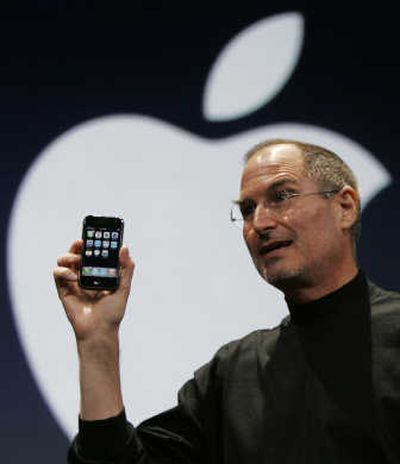‘People hate their phones’

Apple CEO Steve Jobs answered some iPhone questions via e-mail from Wall Street Journal technology columnist Walter S. Mossberg:
Q: Who is the intended customer for the iPhone? Is it for current “smart phone” users? For iPod fans who want a combined device?
Steve Jobs: Almost everyone we’ve talked to hates their phone. The terrible user interfaces keep most users from discovering or using most of the features. We’d like to change that for everyone. Many users want both a phone and an iPod, since most phones are not good music players. When you subtract the $200 cost of an iPod, which is included in the iPhone, the rest of the iPhone costs just $299.
Q: Why did you decide to omit a physical keyboard? Won’t that turn off people who pay a lot for phones like BlackBerrys because they are heavy e-mail users?
Jobs: The iPhone has the best, most advanced keyboard in any mobile device. Like all small keyboards, it takes three or four days to get used to. IPhone users will quickly learn to trust its intelligence to correct their mistakes automatically. So far, everyone who has used it loves it, and reports that they are typing as fast or faster than they did on their Treo or BlackBerry or other smart phone. The iPhone’s keyboard lets us use far more sophisticated software to improve accuracy, customize the keyboard for specific applications, and of course remove the keyboard when it’s not needed, freeing iPhone’s entire large screen for reading email, browsing the Web, looking at maps, enjoying photos and movies, and doing things we haven’t yet invented. We think the iPhone’s keyboard is one of its greatest assets.
Q: Why does the iPhone only run on a relatively slow cellphone data network, much slower than those used by some other smart phones?
Jobs: The iPhone has built-in Wi-Fi and uses the EDGE high-speed data network. EDGE is pervasive throughout the U.S., and for many applications like email, maps, stocks and weather, it is plenty fast. The iPhone automatically switches to Wi-Fi whenever it senses a known Wi-Fi network, and Wi-Fi delivers data several times faster than 3G networks. So the iPhone sandwiches 3G networks with something a bit slower on the bottom and something far faster on the top.
Q: Why does the iPhone only work with a single carrier, AT&T? Will there be iPhones for other carriers?
Jobs: AT&T is the most popular wireless carrier in the U.S. and they have been investing billions of dollars in the last couple of years to create a great network. They also have the advantage of using GSM technology, which is used by over 80 percent of the world. The iPhone is a world phone with quad-band GSM technology that works great in the U.S., Europe and most of Asia.
Q: This first model is missing some features some other smart phones have, like video recording, instant messaging, and real-time GPS navigation. Do you plan to upgrade iPhones purchased now so they have these features? If so, when?
Jobs: We don’t talk about future products. I will say that the iPhone is the most sophisticated software platform ever created for a mobile device, and that we think software features are where the action will be in the coming years. Stay tuned.